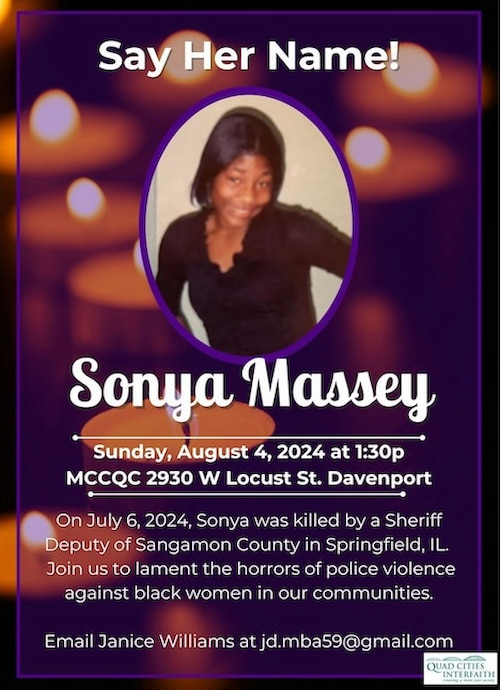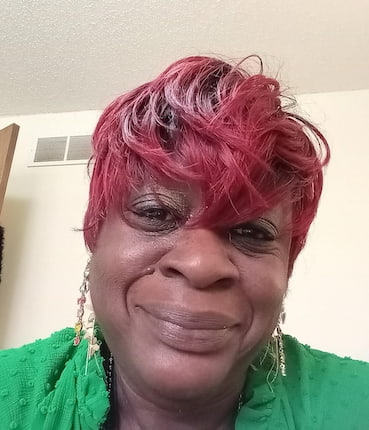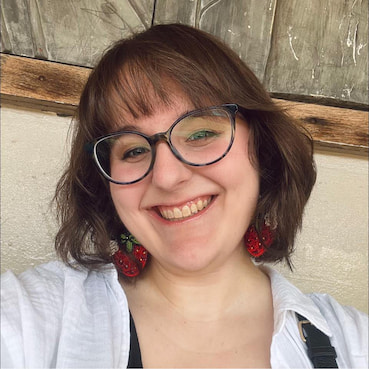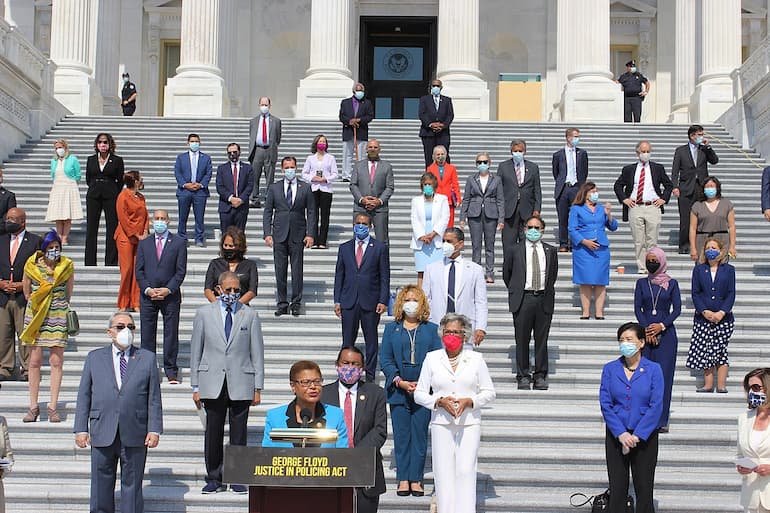DAVENPORT — A nonprofit representing more than two dozen Quad Cities faith, social justice and business groups will hold a “Say Her Name” Vigil Sunday for Sonya Massey, the 36-year-old Springfield, Ill., woman who was killed July 6 by a sheriff’s deputy she’d called to her home for help.

The gathering is organized by Quad Cities Interfaith, the coalition of faith and social justice groups that is leading the drive for a community I.D. in the Quad Cities and rent reform. Metrocom NAACP President Michael Guster will also speak. It will take place at 1:30 p.m. Sunday at Metropolitan Community Church of the Quad Cities (MCC), 2930 W. Locust St., Davenport.
The vigil will remember Massey, a mother of two who was also diagnosed with paranoid schizophrenia, who was shot in her home just after 1 a.m. July 6 by Sangamon County Sheriff’s Deputy Sean Grayson after he’d come to Massey’s home to investigate a possible intruder. It will also press for awareness of police bias against Black women and people with mental health challenges, and for passage of the George Floyd Justice in Policing Act.
Grayson’s behavior throughout the early-morning incident, including the killing itself, was captured by his partner’s bodycam. The video is graphic and disturbing.
“It was on my heart to not forget her name, not forget her life,” said Janice Williams, a QCI board member and also a member of MCC who is leading the effort to hold a vigil for Massey. Williams said she forced herself to study the video of Massey’s killing and was shocked by Grayson’s “callousness.” She’s also disturbed at the details emerging since Grayson’s firing and arrest about previous reprimands, investigations and additional training to learn how to restrain the use of force.
In addition, Williams says she, like Massey, has been diagnosed with paranoid schizophrenia and so relates deeply to what Massey experienced in the minutes before her death.
“She was a human being no matter what her situation was or her mental status was,” Williams said. “I can relate to her situation where I have had to call on the police or the sheriff at times of my mental distress. I’ve always had positive feedback from them, but to see that happen to Massey was a shock to me, not precluding that it happened to George Floyd and so many others.”

Janice Williams, a member of MCC and a board member of Quad Cities Interfaith, is leading the effort to hold Sunday’s vigil for Sonya Massey.
Massey was killed by Grayson during a stop he and his partner made to Massey’s home at her request. She had asked the Sangamon County Sheriff’s Department to send deputies to invesigate a possible intruder outside of her home. Grayson exhibited impatience with and suspicion of Massey throughout the visit, asking why she took so long to come to the door, asking her to find her ID, entering her home while she searched for it, and asking her to remove a pot of water that was heating on her stove.
He began to threaten Massey verbally after she said, “I rebuke you in the name of God,” and said in the video he shot her because he feared she was about to throw boiling water on him. The video shows Massey may have already emptied the pot before Grayson began threatening her. And it shows a crouching Massey saying “I’m sorry” just before she was shot.
Grayson has been charged with first-degree murder and fired.
Vigil aims for greater awareness of bias against Blacks, women, people with mental health challenges
Williams and QCI hope the vigil will help people become more aware of a bias law enforcement can sometimes hold against Black women in particular.
A 2022 survey shows Black people are 12 times more likely to experience police aggression than whites, reports Prison Policy Initiative. That same survey shows that women account for one-third of all people who experience threats or use of force by police. In addition, the percentage of women reporting excessive use of force by police grew 8 percent from 2018 to 2022, from 42 percent to 51 percent.
Kimberle Crenshaw, the activist who created the term “intersectionality” in 2008 to explain how different identities amplify the discrimination experienced by each identity, said people tend to assume that police brutality is about Black men only. Rather, she wrote in a 2023 Los Angeles Times essay, “the invisibility of Black women as victims of police violence is widespread, extending across the social and political spectrum.
“You may know the names Michael Brown, Eric Garner, Tamir Rice, Philando Castille, or George Floyd as victims of police violence, but do you recognize India Kager, Michelle Shirley, Kayla Moore, Michelle Cusseaux or Tanisha Anderson?” she wrote.

Hannah Griggs, community organizer with Quad Cities Interfaith, is among those helping to coordinate Sunday’s vigil.
People with mental illnesses are also in greater danger during police interactions than the general population. Police are 1.4 to 1.5 times more likely to use force when encountering people with mental illness, according to the Illinois Criminal Justice Information Authority.
“When you’re a Black woman and also someone with a mental health condition, you’re existing at the intersection at all three of those identities: mental health, race and gender.” said Hannah Griggs, QCI community organizer, also organizing the vigil. “That can accentuate or compound the discrimination that you face or the prejudices that you face. The violence that was directed at Sonya Massey wasn’t just because she was Black or because she was a woman. It was also because she had a mental health condition.”
George Floyd Justice in Policing Act also focus of vigil
The George Floyd Justice in Policing Act would take several steps to improve police accountability nationwide and was first proposed after George Floyd was suffocated by Minneapolis Police Officer Derek Chauvin. QCI writes that the proposed law would, among other things: “limit qualified immunity, create a National Police Misconduct Registry, and require law enforcement officers to complete training on racial profiling, implicit bias, and the duty to intervene when another officer uses excessive force.”
Griggs said she hopes the vigil will encourage Quad Cities residents to contact their U.S. senators and representatives to encourage passage of the Act, which was passed by a Democrat-controlled House in 2021 and 2022 but never acted on by the Senate. The late U.S. Rep. Sheila Jackson Lee, who died in late July, introduced the bill again this year but it has not advanced.

Members of Congress are shown introducing the George Floyd Justice in Policing Act in 2020. (photo by Jimmy Panetta)
Pastor Rich Hendricks, leader of MCC of the Quad Cities where the vigil will be held, said the rates of police “grossly overstepping their bounds against Person of Color is outrageous. People of goodwill need to come together to draw attention to these injustices and to press for systemic change.”
Other key points about Massey’s killing and the investigation:
• Massey’s grandmother had called police twice the day before her killing, concerned her granddaughter was acting “erratically.” During those calls, Donna Massey had told dispatchers, “Please don’t send no combative policemen that are prejudiced. Please. They are scary. I’m scared of the police.” (ABC7-Chicago)
• Her mother had also called police earlier that day, concerned that her daughter was having a “mental breakdown” (HuffPost). Massey had also visited a hospital earlier the day before her death, and had called police two days earlier concerned that people were out to get her.
• Grayson received more training than other officers in restraint of force because of his prior record (CBS News).
• Grayson received the Sangamon County job partly because of a reference from his father-in-law. (WCIA)
• Grayson has pled “not guilty” to charges of first-degree murder, aggravated battery and official misconduct.
• He is also seeking to be reinstated, with the department’s police union contending he was fired “without just cause” (WCIA). The union also contends Grayson’s superiors shared information about his termination and the investigation into his actions on Facebook without notifying Grayson first, violing the department’s collective bargaining agreement with its employees.
• Three county commissioners are pressing for the Sangamon County Sheriff who hired Grayson to resign. (State Journal-Register)

